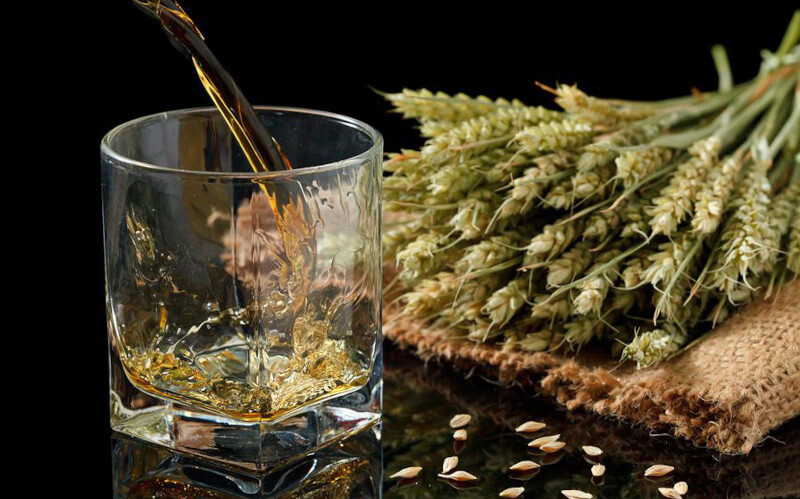To begin, let me say that my medical training is inadequate. Therefore, consult a qualified medical expert if you have any questions or concerns. Now that we have that out of the way, let’s dive in and find out: is whisky gluten-free?
Quite a bit of controversy surrounds this intriguing question. Distilled alcoholic drinks are typically considered gluten-free by specialists in celiac disease. Included in this category are grain-based spirits, such as whisky. Assuming it meets the US Food and Drug Administration’s criterion of having a concentration below 20 parts per million.
A caveat, nevertheless, is present. When it comes to alcoholic drinks in the US, the ATF&TB is in charge of regulation. Additionally, the labeling of grain-based goods as “gluten-free” is not permitted. Regardless of distillation. Whiskey made from barley cannot make the “gluten-free” claim.
Many cereals contain gluten, such as wheat, barley, and rye. Bread, spaghetti, pizza, and cereal are some of the meals that commonly contain it. And whisky, naturally! Gluten does not supply any vital nutrients. The consumption of gluten sets off an immunological response in those who suffer from celiac disease. Intestinal tracts and other bodily areas become inflamed and damaged as a result. According to recent estimations, this illness affects as much as one percent of the population. To prevent inflammation and its effects, a gluten-free diet is essential.
A poll was conducted in the United States by the Consumer Reports National Research Center. Their results showed that 63 percent of Americans think being gluten-free would be good for their health. And as many as one-third of Americans are reducing their use in the pursuit of better health or illness prevention.
So, this is important. People who are trying to limit their gluten intake may abstain from whiskey. Also, before making such a major choice, you would like to know the current situation!
Why Isn’t Gluten Present in Whisky?
Whisky is mostly made from cereal grains. Starch, which is transformed into alcohol, is supplied by them. Wheat, oats, rye, corn, or maize can all be used to make Scotch. Grain must be barley for it to be a Single Malt Scotch Whisky. The other primary components of whisky are detailed in this article.
Wheat, barley, and rye are all grains that contain gluten. However, they are extracted from whisky during the distillation process. Whisky is made by mashing and fermenting grains. Grains are soaked in hot water while they are being mashed. Starch is converted into sugar in this step by malting enzymes. The end product is a clear liquid known as wort. Containers are filled with the wort and yeast. As they grow, the yeast converts the water into an alcohol-carbon dioxide hybrid. As a type of beer, the liquid contains between 8 and 9 percent alcohol by volume.
Beer, naturally, contains gluten, and this particular brewing process will undoubtedly cause issues for anyone unable to consume gluten.
Distilling beer is the process used to create whiskey. Distillation is the process of separating components of a liquid by heating it. 78°C is the temperature at which the beer, or wash, is heated. When the alcohol reaches boiling point, vapor will rise to the top of the condenser. The end product is a beverage called “low wines” that has a significantly greater alcohol concentration, about 23% ABV. The second still, known as the “low wines” or “spirit” still, is where this is transferred for scotch whisky. This is where the process is repeated to produce a 70% alcohol-by-volume liquid.
After a few years of resting in a warehouse, this liquid will be whisky, the result of maturing in a barrel. This is a good place to learn more about dunnage warehouses.
The protein is extracted from the grain during the distillation process. Alcohol, water, and a handful of flavoring congeners are all that remain. That’s the only ingredient in whisky, and it’s the reason it’s made with no gluten. This is why both the US National Institutes of Health and the UK’s Coeliac Association have said that whisky does not contain gluten.
Why Do Some People Insist on Claiming That Whisky Contains Gluten?
Gluten is especially irritating for certain celiacs. Since distillation isn’t foolproof, it could still have adverse effects. The boiling point is the dividing line in distillation. Adding heat to a mixture of chemicals, such as ethanol and water, allows them to separate. As a result, the substance with the lowest boiling point will vanish first. As it rises in the stillness, it will become distinct from the other material. However, a small amount of the second material will begin to evaporate once the majority of the first has evaporated. This second material can evaporate partially before the first one completely evaporates. Thus, the distillate you have is not completely pure.
It is more probable that the gluten proteins will be removed the more distillation you do. Gluten is less likely to be present in products distilled using a Coffey still, which can have twenty or more plates, or in triple-distilled Irish whiskey. Those who are sensitive to gluten, however, may still be affected.
To broaden our horizons beyond scotch whisky, we might say that American whiskey is devoid of gluten. Since corn naturally lacks gluten, whiskies manufactured from corn also do not contain gluten. Heaven Hill’s Mellow Corn and a few Balcones whiskies, among others, ought to be gluten-free. Queen Jennie Whiskey and other sorghum-based whiskies are also available. This facility uses sorghum instead of wheat, barley, or rye. You may rest assured that the whiskey is gluten-free if you choose one of these options.
What Kinds of Whiskies Are Completely Gluten-free?
Try some of the whiskies listed above if you’re seeking completely gluten-free ones. One such choice is corn whiskey. Also, whiskies made from sorghum, including Queen Gennie Whiskey.
Whiskey, it seems, is gluten-free. Distilled alcoholic spirits are, according to the majority of experts on celiac disease, completely gluten-free. Included in this category is whisky, a grain-based distilled liquor. The US Food and Drug Administration has set a limit of less than 20 parts per million for gluten, and this is based on that.
However, issues may persist for coeliacs with extremely severe allergies. Therefore, it is not possible to label whiskies as gluten-free. ‘Gluten-free’ cannot be used to describe whiskey made from barley, for instance, according to the US’s Alcohol and Tobacco Tax and Trade Bureau, which regulates alcoholic drinks. There is an easier argument for calling American corn whiskey gluten-free if we’re talking about that particular brand.

